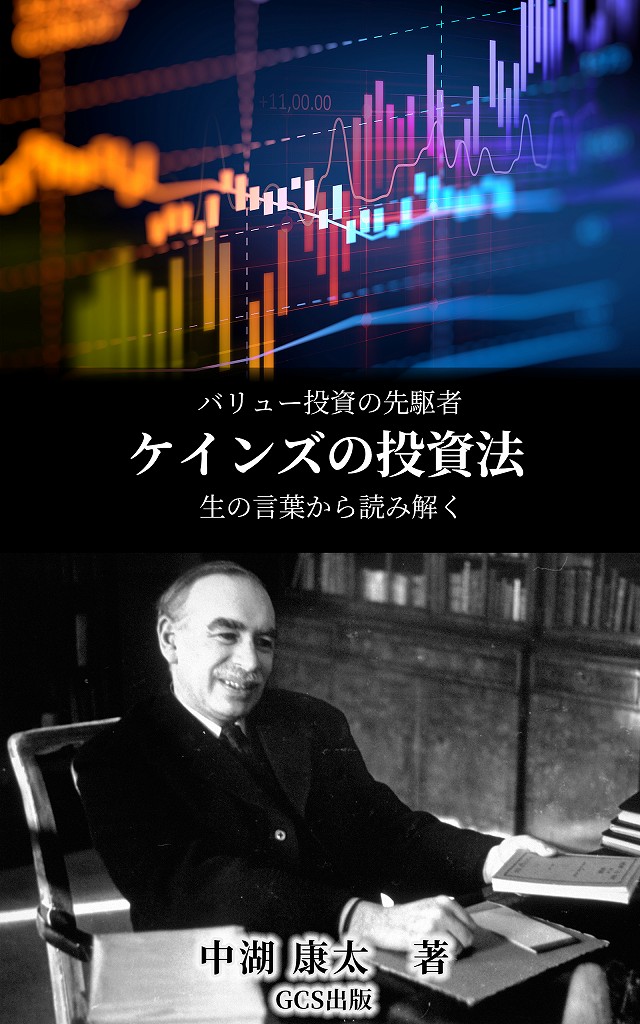キャッシュ・ポジションについての意見の相違
保険会社の流動性
キャッシュポジションを減らすべきとしたケインズの意見に反して、スコットは突然、銀行預金ポジションを増やした。両者の意見の相違は縮まらなかったようだ。
ケインズは、保険会社は一般的に流動性が高いこと、また、プロヴィンシャルは不動産資産をあまり持たないため、特にそうであることを指摘し、キャッシュ・ポジションを増やす必要は無いと述べている。市場性有価証券は流動性が高いことを考慮すべき、としている。
貨幣価値の下落と株式の過小評価
終戦時にあたって、貨幣価値の下落が続くだろうと指摘している。そして、貨幣価値の下落に対して、また、利子率の下落に対して、株式は割安に評価されており、今後そのパフォーマンスが際立って良くなるだろう、という趣旨のことを述べている。
バリュー投資の先駆者ケインズ
優れた経済学者としての知見とプラクティカルな投資家としてのそれが合一した、ケインズならではの指摘である。バリュー投資家としての先駆者ケインズ、を浮き彫りにしているといえるだろう。
ケインズは、次のように返信している。
【F.C.スコットへの書簡 1945年7月25日付】
親愛なるスコット、
私には、未払税金の資金が不足するという理由が分かりません。それは利益に対して必要になるものであり、利益に対して課されるものです。さらに、滞納分の支払いや資金繰りの観点からは、あまり気にしなくてもよいものです。なぜなら納税は、いつも後払いだからです。確かに、問題は、労災補償と海上部門が、車両部門やその他の部門における増加よりも減少するかどうか、ということです。この点は、単に数字を引き継いでいるだけであり、それ以上の意味はありません。その減少は、増加を約5万ポンド上回っていますが、税控除後の当期利益によって十分相殺されるものです。実際に、そのようになれば、かなり驚きですが、それは別の話しです。
しかし、これらの数字がどうであろうと、問題の本質は、異なる点にあると私は考えます。債務が減るというのは、ほとんど市場性有価証券によるものです。市場性と非市場性の区別は、短期と長期ではかなり異なります。市場性有価証券については、その点で議論の余地がありますが、一時的なポジションについてはそれほど議論にはならないでしょう。一般的に言って、保険会社は、市場性という意味で、かなり流動性を持っています。
私は、いつも投資方針を検討するに当たって、このことに着目しています。我々のポジションは、多くの保険会社よりも著しく流動性が高い状態です。というのも、不動産資産、モーゲージやその他の非流動的な資産が通常よりかなり少ないからです。実際、直近の役員会で、私たちは、かなり市場性の低い有価証券を処分しました。
現金又は現金同等物と、通常の投資資産の選択は、大きくは、それ以外の配慮からなされているように見えます。まず第一に、リスクの観点からです。つまり、私たちは、かなり高い比率で安定基金を扱っています。第二の点は、特定の時点での市場が高いか、低いかについての判断です。
このような観点から、現金同等物へ傾斜を高める状況は、しばしば起こり得るでしょう。例えば2年後に、そのような状況が生じたとしても、私は全く驚きません。 しかし、現在の状況は、全く異なるものです。超過利益に対する税金や、その他の戦時措置により、株式が、長期的に貨幣価値の変化を反映させることを妨げています(株式が過小評価されていると解する;KN注)。近い将来に貨幣価値の下落が、転換することは無いだろうと、かなりの確信を持って言うことができます。平和状態がより鮮明になるにつれ、良く選択された株式のパフォーマンスが極めて良くなることでしょう。さらに、予想が難しい将来の本当のリスクは、物価のさらなる上昇が、賃金の上昇などの国内要因、又は、食料や原材料などの国際価格の上昇から引き起こされるのか、ということです。これらは、直面するリアルな、真正のリスクであり、賢明な投資においてヘッジすべきものです。
同様のことが利子率についてもあてはまります。ギルトエッジの利子率は、一般の予想に反して下落してきました。このトレンドは、反転することなく、続きそうです。 ここでもまた、利子率下落の影響は、私の見るところ、まだ、十分に、株価には反映されていません。
(続く)
Comments and translation by Kota Nakako
2025/08/17
***************************************
(Original texts below)
To F.C. Scott, 25 July 1945
Dear Francis,
I still do not see how we can be short of cash for currently accruing taxes, since they are necessarily on profits, which come to us in cash. Moreover, we never have to take account from the cash point of view both of arrears and prospects, since the paying over of taxes is always the same amount in arrear. Surely, therefore, the question really comes down to the issue whether Workmen’s Compensation and Marine are likely to shrink more than Motor and other departments increase. On this I was simply going on our figures. They show there is not much in it, namely that the shrinkage will exceed the growth by some GBP50,000, which will be more than offset by current profits after deduction of tax. In fact, I think we shall both be rather surprised if things really work out like this, but that is another matter.
However, in whatever way these particular figures may work out, the argument, as I see it, is rather different. If there is a liability to shrinkage, it means that we should be to a fair extent in marketable securities. The distinction of marketable and unmarketable is quite different between short-dated and long-dated. I think there is an argument for being in marketable securities, not perhaps so much on a possible temporary position, but in general an insurance company should be liquid in the sense of being marketable.
I have always myself aimed rather definitely at this in thinking of policy. I should say that we are considerably more liquid than most insurance companies, since we have so much less in estate, mortgages and other sticky stuff. In fact, at the last Board Meeting we expressly took steps to clear out a few securities which seemed particularly unmarketable.
The choice as between cash or near-cash and investments proper seems to me to depend primarily on other considerations. There is first of all the general issue of risk, and that we are dealing with by the rather high proportion of the Stable Fund. The second consideration is whether at any given date our judgement is that the market is high or low.
A situation may easily arise in which I should be greatly influenced in favour of near-cash in these grounds. I should not be at all surprised if that is not the position, let us say,, two years hence. But the present position seems to me most definitely of the opposite character. The incidence of Excess Profits Tax and other war measures has prevented equities from reflecting in the long run they must, the change in the value of money. I feel great confidence that there is no likelihood of a reversal of the trend towards a falling value of money in the foreseeable future. Thus, when we move into clearer peace-time conditions, I should predict with a very high degree of confidence that a well-selected group of equities is bound to do well. Furthermore, the real risk of the future, about which it is difficult to predict for certain, is whether we may not be in for a further rise of prices due either to internal reasons (i.e. increases of wages= or external reasons (i.e. a general rise in international prices of food and raw materials). These are the real, genuine risks ahead of us, against which wise investment should endeavour to hedge.
Much the same applies to the rate of interest. Gilt -edged rates have trended downwards, to the surprise of a good many people. It is much more likely that this trend will be continued, though perhaps not very decidedly, rather than that it will be reversed. Here again the eventual effect of the falling rate of interest has not been fully reflected, in my judgement, in the prices of equities.
(To be continued.)
Source: The Collected Writings of John Maynard Keynes, Economic Articles and Correspondence: Investment and Editorial, Vol. 12



















